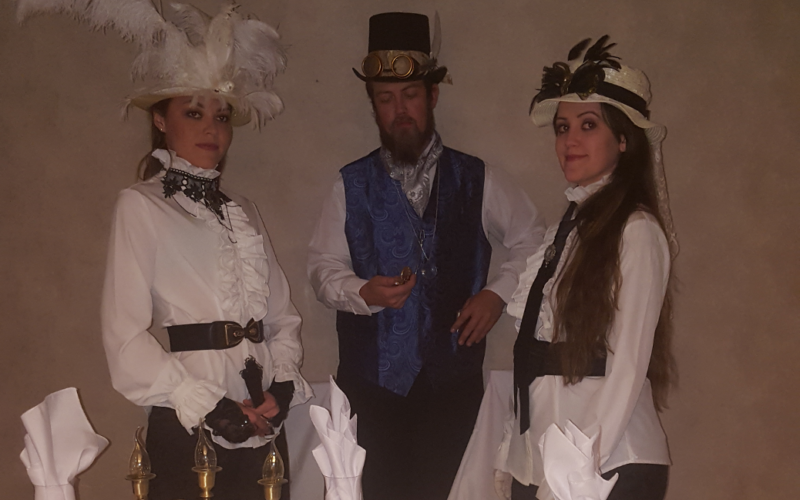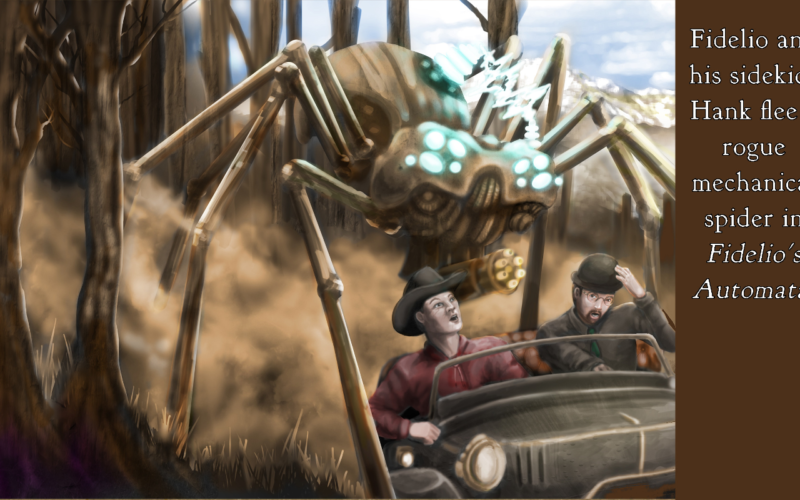
In my quest for new steampunk fiction, I was delighted to find Clockwork Lives with the famous Neal Peart as a co-author. For those too young to know him, Peart was the drummer and writer for the progressive rock band Rush. The novel is a companion to Rush’s concept album Clockwork Angels from 2012. In my younger days, I followed the band religiously, so it’s ironic that I encountered the book before the album. The other author, Kevin J. Anderson, is a prolific science fiction author but I wasn’t familiar with his works. Besides steampunk, he writes in other subgenres such as space opera.
Rush, which appeared in the early 1970’s, released several albums with a science fiction theme, notably 2112 (1976) and Hemispheres (1978.) Since they’ve retired from recording and touring, it appears that Clockwork Angels will be their last album of original content. I’ll review it in a future column.
I was eager to read a novel by the multi-talented Peart, whose song lyrics often tell stories of individualistic heroes confronting oppressive forces. Clockwork Lives is a bit of a departure from that, though freedom versus conformity is a significant theme. The book is a fantasy-type steampunk, set on an alternate world. It’s as a collection of related stories in the fashion of 1001 Arabian Nights. The world “Lives” in the title is a noun, not a verb. Yet the main story thread is more than a wrapper for those stories. It seeks to answer the question, “What constitutes a well-lived life?” Many of the book’s incidents and characters are modeled on songs from Clockwork Angels. It’s also interwoven with phrases and themes from Peart’s earlier works. As a long-time Rush fan, I loved that aspect.
The book’s protagonist is Marinda Peake, a 30-something woman who’s spent her entire adult life caring for her ailing father. They live in the land of Albion, which, contrary to the name’s implication, is not exactly an allegory for Great Britain. The nation’s ruler is a mysterious figure called the Watchmaker, who enforces a cult of stoicism and practicality. Like most of her compatriots, Marinda’s life revolves around her work, with no use for frivolities like entertainment or travel.
Marinda’s parents are a different story. Her mother abandoned her as an infant, leaving her father to raise her alone. He’s a retired inventor and adventurer who regrets consuming his daughter’s life with duty and drudgery. During the opening chapters, he dies leaving a will with an unexpected clause. He bequeaths Marinda a blank book which she must fill with the stories of other peoples’ lives. Until she has done so, she may not claim her inheritance or reside in the family home.
Marinda is furious at this disruption of her life, but she accepts her father’s dictates. The book is one of his marvelous inventions. The pages are treated with an alchemical formula that requires only a drop of blood to record the donor’s life story. A vial of her father’s blood provides the first tale. His story is filled with adventures he never told her, in particular how he helped the Watchmaker animate his famous Clockwork Angels. (These are quasi-religious figures that issue proclamations to the people on designated occasions.)
With many empty pages to fill, she approaches the people of her town for their stories. Most have led such uneventful lives that their stories fill only a paragraph. Marinda realizes she must travel and seek out people with lives interesting enough to fill multiple pages.
On her journey, Marinda encounters many fascinating people, both heroic and villainous. She meets and angers the Watchmaker, who exiles her to the faraway land of Atlantis. The stories of those she encounters occupy chapters of various length. In the audiobook version, Morgan Hallet narrates the majority of the book but the individual stories have their own readers. The authors themselves each narrate one of these.
In her travels, Marinda encounters both joy and hardship and finds meaning and happiness in pursuits she once thought frivolous. Though that aspect of the book was predictable, the people’s stories held some interesting surprises. Some readers might be put off by the book’s slow pace at the beginning, but this improves as it goes. Personally, I enjoyed it all.
As a steampunk novel, Clockwork Lives departs from many of the standard tropes but still holds true to the general theme. Though some might find it slow at first, most steampunk fans will enjoy it. I give it 4.5 out of 5 stars.



































